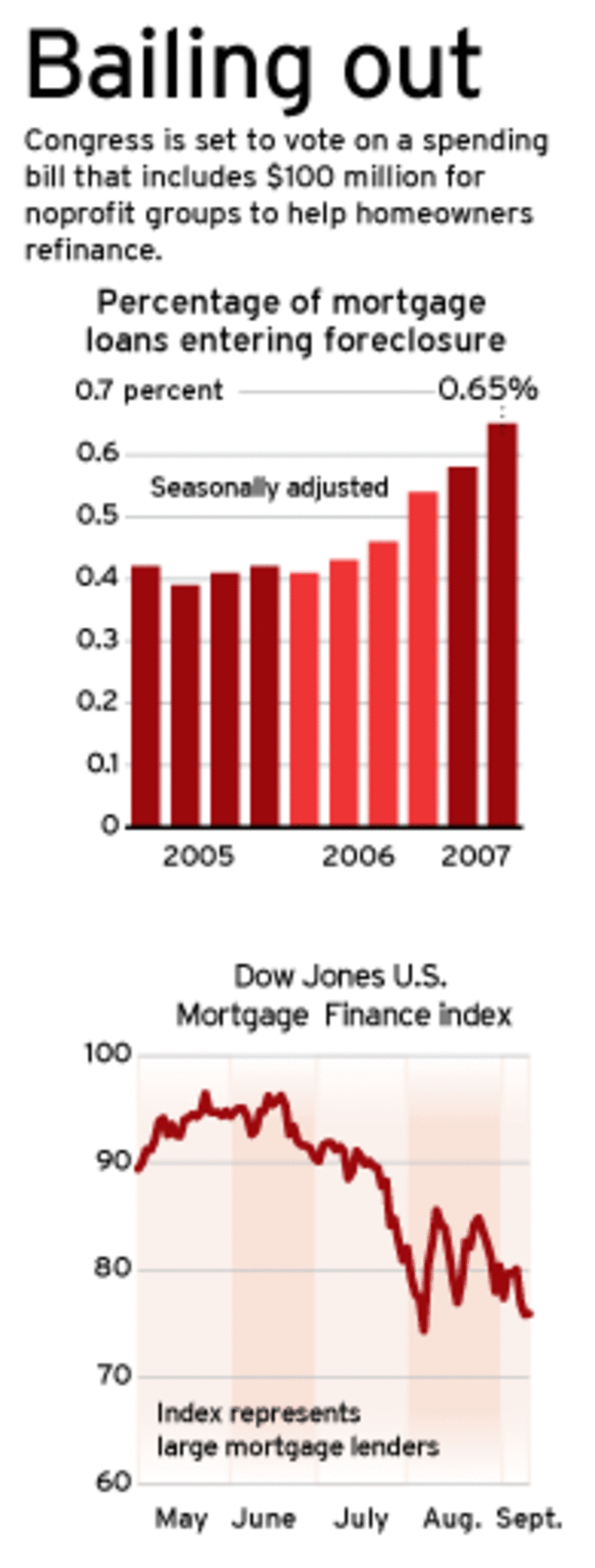Deborah Banigan of Pleasanton, Calif., considers herself a relatively experienced consumer, having bought, sold and refinanced several homes over the past 18 years. Two years ago, she signed up for an adjustable-rate mortgage that gave her the option for a lower payment, which she expected to carry for a year or so before converting back to a fixed rate.
But this adjustable turned out to be one of the most volatile mortgages written during the housing boom — a so-called “Option ARM” that can reset much higher, and more rapidly, than more traditional ARMs. In Banigan’s case, her 4.25 percent starter rate has jumped to 7.88 percent.
“I recently reread the loan contract,” she said in a recent e-mail, “and nowhere did it ever state in clear dollars and cents what a fully amortized payment would be — even at the start rate. I never saw that amount until I received my first statement. … Had I fully understood what I do now, I could have made other choices.”
That kind of disclosure — or lack thereof — is at the heart of an investigation announced Tuesday by the Federal Trade Commission, which has sent warning letters to more than 200 mortgage brokers, lenders and media outlets warning about “potentially deceptive” mortgage advertisements that may withhold information buyers need to understand the true cost of their home loans.

"Many mortgage advertisers are making potentially deceptive claims about incredibly low rates and payments, without telling consumers the whole story," said Lydia Parnes, director of the FTC's Bureau of Consumer Protection.
Those claims are central to an ongoing debate on Capitol Hill about whether the federal government should step in to help some borrowers now facing foreclosures who were the victims of predatory lending practices. On Monday, Sen. Charles Schumer, D-N.Y., proposed allowing two government-sponsored mortgage giants, Fannie Mae and Freddie Mac, to take a bigger share of the home loan market to help stabilize the troubled mortgage industry.
Opponents of these measures argue that borrowers should have known better than to take out loans they couldn’t afford. But many of those following the unraveling of the mortgage market say that at least some borrowers were duped by mortgage brokers or lenders who failed to properly disclose the full impact of adjustable loans with rapid and substantial “resets.”
“It absolutely is the responsibility of the lender to explain all the terms and conditions including the cost of the loan per month when the loan resets,” said David Berg, a Houston attorney involved in mortgage fraud cases. “From the evidence that we’ve gathered, it was rarely made clear.”
Many of subprime and other “exotic” mortgages that fueled the housing boom touted unconventional features like interest-only payments, lower "teaser" rates, and monthly payment options that involved “negative amortization” — which keeps initial monthly payments low by raising the total amount borrowed, only to create much bigger payments after the loan resets.
Some marketing pitches rely heavily on the financial benefits of these products. But emphasizing only the advantages of a loan is unacceptable, according to Lucy Morris, an FTC attorney working on the deceptive ads investigation.
“If they're only telling you half the truth and only telling you the good things and not telling you the other important things you need to know in evaluating a mortgage advertisement, then that may raise questions under the Federal Trade Commission Act and the Truth in Lending Act, which we enforce.”
The FTC would not identify the companies under review. So far, the probe into deceptive mortgage advertising has produced only warning letters, said Morris. As a result of the review, the FTC could decide to bring civil actions, she said.
Despite their initial appeal, many of these unconventional loans have saddled millions of borrowers with unexpected financial burdens. Some borrowers were told not to worry about “resets” because they could get a new loan in a few years with a better rate. But substantial prepayment penalties in some cases are now preventing homeowners from refinancing to better terms.
In response, mortgage brokers and lenders point out that while loan terms may not be fully detailed in marketing materials, borrowers sign documents at closing that spell out — in extensive legal disclosures — the terms of a loan. But that doesn’t make up for deceptive ads or marketing pitches, said Morris.
“The fact that you get disclosures at closing — we don’t think necessarily will cure deceptive practices,” she said. “And if an ad is deceptive, it’s deceptive. It’s not enough to make a disclosure later on. It’s still deceptive.”
To keep attracting borrowers, some mortgage lenders continue to tout the appealing side of their products. One recent ad urged borrowers to “get a $250,000 loan for $650 per month.” But a fully amortized, 30-year fixed rate mortgage for that amount — at prevailing rates of about 6 percent — would cost nearly $1500 a month.
As a result of the reports of subprime lending abuses, the record pace of foreclosures and the recent panic that swept the credit markets, funding for these unconventional loans has all but dried up. While that may reduce the risk of new borrowers getting stuck with them, some mortgage brokers and lenders continue to advertise terms that appear to good to be true.
“The likelihood of a borrower qualifying at these lower rates is dismal at best and more probably they’re going to be pushed into another deal,” said Arthur Preston, a consulting and insurance firm that specializes in mortgage fraud. “So you don’t have the same risk you had before with the Option ARM resets, but you do have this problem of attracting borrowers to products that they can not qualify for an ultimately resulting in a bait and switch loan.”